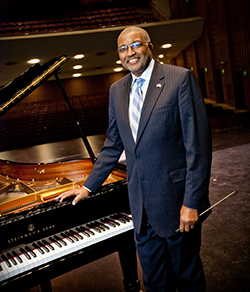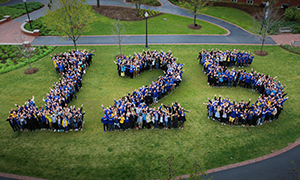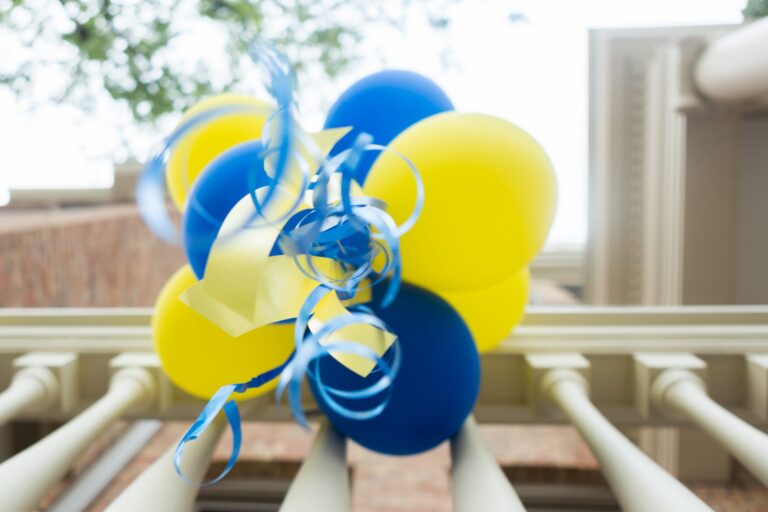
CHICAGO (May 10, 2016) — ��ݮӰ�� alumnus Dr. Marvin V. Curtis is no stranger to writing original songs for major events. The renowned composer has received numerous commissions for musical works from churches and schools, performed at the White House and at presidential cabinet members’ memorial services, and crafted the piece “City on a Hill” for President Bill Clinton’s inauguration. But Curtis, the first African American composer commissioned to write a choral work for a presidential inauguration, is currently working on a piece that’s a little closer to home.
Curtis has been commissioned to compose a work that will be performed by students at on September 23, 2016. “ is honored that Dr. Curtis has accepted our invitation to compose a musical piece for the event,” said , dean of the School of Music. “The piece will be written for choir and a chamber instrumental ensemble, using a text that will be meaningful for the occasion. We very much anticipate the performance of his music, and we are confident that it will be a highlight of a very memorable celebration.”
We spoke with Curtis, dean of the Ernestine M. Raclin School of the Arts at Indiana University South Bend, about his time at ��ݮӰ��, performing for presidents, and what to expect from his 125th anniversary piece.
��ݮӰ��: How did you first come to ��ݮӰ��?
Marvin Curtis: An admissions counselor at ��ݮӰ�� in the ‘60s came to my high school a couple times, Harlem High School, on the South Side. I wanted to go away to school. I came to ��ݮӰ��’s campus, and I remember walking around thinking, Okay, it’s still Chicago; I could live on the campus because they have housing. So I auditioned and was accepted, got a scholarship, and I came that fall.
NP: What are some of your favorite memories from your time as a student?
Curtis: It was a very different experience coming from inner-city Chicago to ��ݮӰ��. But I became part of the student body government, got involved in a bunch of different activities, and was a dorm counselor my third and fourth years. For three or four years, I was in charge of the Homecoming Committee, so we did a parade, we had fireworks—I had a lot of ideas. I was really engaged. At the same time, I was in the choir. I wrote my first compositions then, and the choir sang them on tour up and down the West Coast. One was called “Worship the Lord,” which was one of the first pieces I had published in the ‘70s. It was very different being in the choir and singing the pieces that I wrote. But the music faculty recognized my talent, so they programmed them! It was amazing to be a college junior and have your music sung by the ��ݮӰ�� College Choir every night on tour, and then Orchestra Hall, and then later on, get those pieces published.
NP: What was the campus like at that time?
Curtis: It was a very interesting time. It was the late ‘60s, so there was a shift happening in politics. But I got to meet a lot of people, and being an African American student on campus, there were only 35 of us, and I was the only one in music. But it created an interesting dynamic. And I got involved with in the summertime, and Professor F. Burton Nelson, who I’d met along the way, got me involved. Burton kept me centered. I remember, my first year, we latched onto each other. So whenever things got crazy, I would go see Burton and explain stuff to him and we would agree on certain things. I was really involved with what was going on. But I had a good time meeting people and growing up. The music program really allowed me to grow and shape my thoughts about music education. They taught us to think outside the box.

NP: How did ��ݮӰ�� influence the trajectory of your career?
Curtis: I graduated in 1972, and thanks to Burton Nelson, I ended up in the Seminary. I was working at Grace Covenant Church up the street, and Burton enticed me to study Christian education. So I was one of the first students that did the joint program with the Presbyterian School of Christian Education. I did my first year at ��ݮӰ��, then moved to Richmond, Va., and did my second year down there. So thanks to Burton, I got a master’s in Christian education. ��ݮӰ�� was a big part of my life. I actually spent summers here working in the Student Union. And after my first year, I said, “I don’t think I want to go back home.”
After getting my master’s, I moved to New York to teach, and also took a couple of church jobs. I ended up at Riverside Church, with my own choir. Then I left New York and moved to California. Eventually, I was invited to come to the University of the Pacific in California for a fellowship, so I came out there in ’86 and graduated four years later with my doctorate. In the meantime, I’m still writing music. I had done commissions for several schools and churches. I ended up getting my doctorate and moving, then, back to Richmond.
NP: And that’s when you were commissioned for the presidential inauguration?
Curtis: Through a friendship I had, I got the opportunity to write for the president. He called me up one day and said, “We want you to write a piece for us. We’ve been asked to sing at the inauguration, if Bill Clinton wins.” He knew Clinton. And he knew me as a composer, and asked if I could write this piece. I thought, You have to be kidding. This was in September 1992. So I called him back and said, “Are you serious?” He said, “Yeah!” So I began working on “City on a Hill.” And I ended up at the inauguration with the president, sitting on top of the Capitol, shaking his hand afterwards, and hearing my piece performed live with the United States Marine Band on top of it.
NP: What was that like?
Curtis: I’ve described it several ways. People asked how I felt, and I would say, “All the people in my life that told me I wasn’t going to do anything are watching me on television.” It was very humbling, too, because I was sitting there listening and watching the ceremony, and it didn’t dawn on me that this was being broadcast around the world. So people around the world heard this piece that I wrote. Totally blew me out of the water.
NP: How do you find inspiration to write a piece for something that big?
Curtis: I thought, I want to leave the president a message with this song. So the message came out of Colossians, and then I had a text. Within two days I had written this whole thing. And I’m writing it and faxing it to my publisher and he’s writing back with some notes and corrections. And then we just waited until the election came. In December, I went to Little Rock, Ark., to hear it for the first time, and they sang it, and I was blown away. So there I was, January 20, 1993. I sat there and watched this take place, and it’s still amazing to me. My music is now in the Clinton Library, it’s in the Smithsonian, and it’s still being performed.
NP: What made you want to come back and do something for ��ݮӰ��?
Curtis: I’m very honored that my alma mater would ask me to do something like this. I know it’s about the celebration of the school, and as an alumnus of ��ݮӰ��, I know something about the school. I know about the capabilities of the school. So I thought, Let’s do something joyful.
NP: Were there things about ��ݮӰ��, based on your experiences here, that you wanted to make sure you included in a piece about it?
Curtis: The text I used for one section of the piece is from Luke 13:29: “The people will come from east and west, from north and south, and will eat in the kingdom of God.” I started with that verse first as a potential text because that was my experience being at ��ݮӰ��: people came from all over. That was something about ��ݮӰ�� that I really liked: it was not just people from Chicago. People came to this one school for a common purpose. It was interesting for me, being a kid from Chicago, to begin meeting people from all over the country. I was able to make friends from all over because of ��ݮӰ��. I also traveled across the country with the Concert Choir. For me, it was a way of connecting the dots.
NP: What else will the song convey, textually or musically?
Curtis: I got an idea of the kind of text I want to use from the book of Micah. There are four verses on display at the center of campus, including Micah 6:8: “What does the Lord require of you? To act justly and to love mercy and to walk humbly with your God.” That’s one of my favorite passages. I’m trying to craft this to reflect the ideals that I learned at ��ݮӰ��. The section that I wrote for the Luke passage is more of an introspective part. But the piece will open triumphantly and will close the same way. Most of my music has a big opening and a big closing, and I think that’s the way this has to be—this is a celebration. But it’s still formulating itself. Getting that soft part written took a while, but I got it the way I wanted it.
NP: How does the process of composing this piece compare to your process for something like a presidential inauguration?
Curtis: I’m a text-painter. The text, for me, is driving the writing of the music. For example, this part about “the people will come from east and west.” I could’ve used it as a bombastic thing, but I decided to use it as a quiet section. When I wrote “City on a Hill,” I started with John Winthrop’s speech, the actual “city upon a hill” part, first, and then worked everything else around it. With “City on a Hill,” it was a quiet text, and I built everything else around it, and I’m doing the same thing with this. That piece was specific in its nature. I always use the phrase, “I was trying to figure out what to say to the president in music.” In this case, I’m trying to say, “How do I celebrate my school in music?” So that’s the approach I’m taking. There are loud moments; there are quiet moments. I’m trying to do that in the sense of making it so that it fits a celebration of an institution and what it’s done over 125 years.
Follow ��ݮӰ�� on Learn more .


